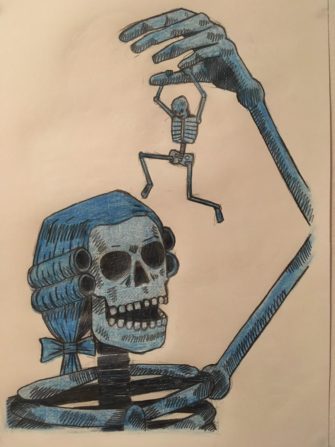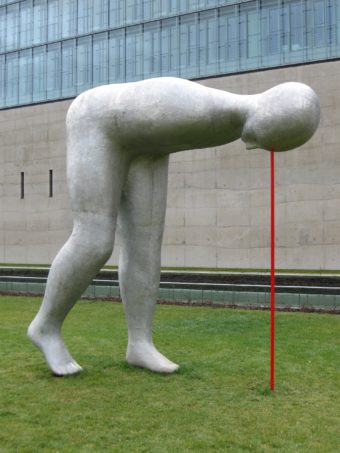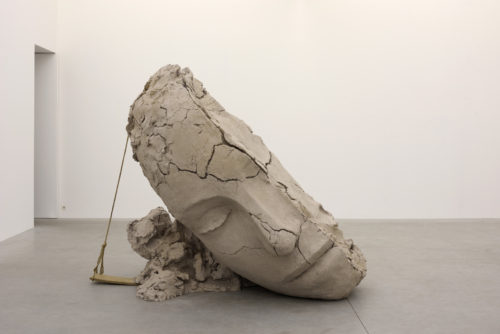
Leonardo Da Vinci (Sketch for St Jerome, detail, 1482
“There is seduction in apocalyptic thinking. If one lives in the Last Days, one’s actions, one’s very life, take on historical meaning and no small measure of poignance.”
Eric Zencey
“We project onto the future what we cannot endure as something which already occurred, or which is happening now. We still believe that the worst is yet to come—it is a perspective, but not a reality, and therefore our reality is still not that bad. A fear of the future and anxiety about some indefinite event (“we will all die”) is easier to suffer than a certain, irreparable, and irreversible horror that has just happened (“we are all already dead”).”
Oxana Timofeeva (E Flux, June 2014)
“The end of the world is a permanent reality; it constantly repeats.”
Father Alexander Men (Speech at inauguration of Open Orthodox University , 1990)
“Today the zombies are our neighbors.”
George Romero (comment at the premiere of Land of the Dead, 2005)
The popularity of apocalyptic thinking is seen in Hollywood films, but it is now also now appearing in discussions of environmentalism. There is the Paul Erhlich branch, the population bombers (which I wrote about here..(https://www.counterpunch.org/2019/04/03/population-bomb-or-bomb-the-population/) but it is also tied into all manner of predictions, many of them tied into the 6th Mass Extinction meme. Now that theory originated with Elizabeth Kolbert (and if not literally her, she certainly popularized it, not least by appearing on The Daily Show with Jon Stewart).

Awoiska Van der Molen, photography.
“‘I AM WHAT I AM.’ This is marketing’s latest offering to the world, the final stage in the development of advertising, far beyond all the exhortations to be different, to be oneself and drink Pepsi. Decades of concepts in order to get where we are, to arrive at pure tautology. I = I. He’s running on a treadmill in front of the mirror in his gym. She’s coming back from work behind the wheel of her Smart car. Will they meet?”
The Invisible Committee (The Coming Insurrection, 2009)
“The irrational has become respectable and often unstoppable.”
Kurt Anderson (The Atlantic, Sept 2017)
“We have never seen nothingness, we cannot imagine it or describe it, in fiction, film or image, and at best (or worst), for Derrida, in customary gnomic style, ‛the future can only be anticipated in the form of an absolute danger’.”
Maria Manuel Lisboa (The End of the World)
The real threat of environmental calamities is being both exploited by western Capital as the engine of new Green corporate endeavours, and is becoming a psychic retreat, a kind of night-terrors but for the adult. (“Sleep terrors are episodes of screaming, intense fear and flailing while still asleep. Also known as night terrors, sleep terrors often are paired with sleepwalking. Like sleepwalking, sleep terrors are considered a parasomnia — an undesired occurrence during sleep. A sleep terror episode usually lasts from seconds to a few minutes, but episodes may last longer.Sleep terrors affect almost 40 percent of children and a much smaller percentage of adults”.{ Mayo Clinic Patient Care, Symptoms and Causes}.
I have personally met with very few people who believe in the most dire predictions (the earth will end in two decades, etc) who have anything remotely practical to say about these beliefs. Most still are saving for their children’s tuition or their own retirement. And yet there is an almost theistic tone to their beliefs, and an anger at those who approach these predictions with anything like credulity.

Lara Viana
There feels to be a kind of strange anti-consensus consensus. As Hiroyuki Hamada said to me, it’s as if everyone must surrender to the crises. And this is the feeling I get. And certainly what makes this very difficult to tweeze apart is that, of course, there is a crises. But the parameters of that crises are being obscured by (as someone said) the ‘omerta’ of mainstream media, the utter dishonesty of the governments of the world, and the dishonesty of global capital, but also by the psychic or psychological reaction of both the right and the left. On one side are MAGA reactionaries who see global warming as a fraud, a con, and then on the left, or pseudo left, too, a kind of submission to the most alarmist declarations and predictions from “scientists”. And there are scare quotes around scientists because this feels, at least to me, a highly contested area and definition.
Robert Fletcher,Valerie Puleo and Jan Breitling write in the intro to their paper “Barbarian hordes: the overpopulation scapegoat in international development discourse (Third World Quarterly, 2014).”
“Despite sustained critique of a neo-Malthusian focus on ‘overpopulation’, the issue continues to resurface regularly within international development discourse, particularly with respect to ‘sustainable’ development in relation to growing environmental security concerns.This suggests that the issue defies purely rational evaluation, operating on a deeper psychodynamic register. In this paper we therefore analyse the population question as a ‘scapegoat’, in the psychoanalytic sense of a fantasmatic construction concealing the gap between the symbolic order of international development and its persistent failure in practice. By conjuring the age-old image of animalistic barbarian hordes breeding inexorably and therefore overflowing theirThird World confines to threaten the security –and enjoyment of wealthier nations, the overpopulation bogeyman helps to displace attention from systemic issues within the political economy of development, namely, the futility of pursuing sustainable development within the context of a neoliberal capitalism that characteristically exacerbates both economic inequality and environmental degradation. { } Despite such efforts at refutation, however,the overpopulation bogeyman has continued to crop up periodically in development discourse to the present day. The resilience of this frame in the face of copious contradictory evidence suggests that its persistence defies purely rational evaluation of the factual basis of the thesis (if such a thing exists), operating at a deeper psychodynamic register.”

Audrey Casalis
And this deeper psychodynamic register is one that also finds expression in the almost impossible popularity of zombie and vampire franchises in film (different but related) and in the increasingly morbid subjectivity that is interconnected with disenfranchised class and economic status, or perceived status, and the sense of hollowed out individualism. The growing or bleeding of awareness that ‘my’ individuality is not very individual. And for the left, for radical voices, and in particular for working class radicals, the toll is enormous. The constant assault and stigmatizing, the subtle humiliations, the lack of respect and/or recognition. It wears one down.
“Had population and food increased in the same ratio, it is probable that man might never have emerged from the savage state.”
Malthus (Essay on the Principle of Population, 1792)
The sense of submission to the crises, then, marks a de-coupling from Marxism and probably from any variety of anarcho libertarianism, or really other radical political positions. It is surrender to power, to one or another pre-digested subject positions. The tyranny of enforced opinion.

Folkert de Jong
I have said before that part of the appeal of post apocalyptic fiction and film is the desire FOR end times. Steven Schlozman a Harvard medical school child pyschologist says…
“I talk to kids in my practice and they see it as a good thing. They say, ‘life would be so simple—I’d shoot some zombies and wouldn’t have to go to school,'” Schlozman says. In both literature and in speaking with patients, Schlozman has noticed that people frequently romanticize the end times. They imagine surviving, thriving and going back to nature.” (Scientific American, Daisy Yuhas, 2012)
And this is hugely important. Its a very big factor, in fact. The fantasy of reconstruction. Of getting to start over. And it also elides with new age imagery and style, that having to do with going back to the land. But lurking in this surrender to the crises is a surrender to fascism, too. And this in turn is tied into the theistic quality of the warnings and admonitions. For I have been chastised for my wife and I having had children recently. And it is instructive to examine this to the degree that what is being advocated (not having children) is utterly nihilistic, and also suggests a strange death cult reverberation — no more children! The alibi is that the people who admonish child bearers are only *concerned* about the suffering of the children. Now, this would suggest all manner of cognitive dissonance (many of those concerned finger waggers are parents themselves, usually of older children), for one the idea that there is a firm timetable out there and second, and more importantly, *that nothing can be done*. And I hear this a lot, ‘it’s too late’. We have crossed the point of no return. We have breeched some imaginary planetary limit for populations.

David Herbert
“After the World War I the new discipline of demography arose in the USA,strongly influenced by eugenics, framing the overpopulation issue as essentially a question of women’s fertility; it related the apparent diversity in fertility rates across societies and social groups to class as well as intelligence and other personal characteristics.27These narratives were still present three decades later with the establishment of The Population Council in 1952 by D Rockefeller III as a result of concerns about growing populations in developing countries and their impact upon wealthier societies with lower fertility rates { } Population control programs were often explicitly linked with national security concerns. The US National Security Council’s(NSC) 1974 study memorandum stated that the political consequences of demographic factors were damaging to countries ‘in whose advancement the US is interested, thus creating political and even national security problems for the US’. { } Environmental degradation first became linked with overpopulation in the 1960s with the growth of the modern ecological movement, most notably byPaul (and Anne) Ehrlich in their 1968 book The Population Bomb, which predicted environmental collapse, human suffering and massive starvation on a global scale as a result of future increases in human population.Garrett Hardin reinforced the association in his famous ‘Tragedy of the Commons’ essay, also published in the same year,an association further solidified by the 1972 Club of Rome report The Limits to Growth”
Fletcher, Puleo, Breitling (ibid)

Natvar Bhavsar
What I have found, though, at least in terms of the population question, is that those who fear numbers of people are impervious to argument. Simply utterly impervious. Again suggesting a deeper psycho social register of complaint at work. Ehrlich’s work, and his infamous IPAT equation is completely indifferent to class, ethnicity, gender, or history. The internal make up of the numbers doesn’t matter, and to the more enthusiastic defenders of Ehrlich the internal make up doesn’t matter because they know the make up. The image in the minds of most is not Connecticut or Dallas, but Lagos and Sao Paulo and Jakarta. The global south is the target. And none of the factors that mitigate numbers — the western corporate extraction of resources for use IN the west, or the pollutions from militarism tied into Western capital, is discussed. And in media and in schools these numbers are recited as if gospel. That alone should make any leftist pause, but for many it does not.
Fletcher, Puleo and Breitling also touch on a secondary engine for the overpopulation thesis, and that is sexuality. And more to the point, the regulation of sexuality. And here the spectre of eugenics appears once more. This also harkens back to Christian missionaries and colonial administrators.
“The creation of raced, classed and gendered “others” serves to legitimize Western neocolonial efforts in so-called “developing” (read “backwards”) countries. As a result, often coercive – if not genocidal – population control programs targeting non-Western women (and women of color and poor women in the US) have been “justified” by virtue of the status of these women and communities as ‘other.'”
Jessica LeAnn Urban (Constructing Blame: Overpopulation, Environmental Security and International Relations, 2001)

Takuma Nakahira, photography.
How this impinges on this ‘surrender to the crises’ is both obvious in one sense, but also strangely opaque, too. For overpopulation fears are just one source of this apocalyptic fascination that seems to be growing in the West. Now, the actual threat of environmental problems, whatever exact degree one assigns it, is beyond debate very acute. And the cognitive dissonance in part comes out of he various strategies of obfuscation that the state and mainstream media employ. Living under the Trump administration — an administration that feels increasingly like the logical end game for western capital — gives everything, literally, a slightly surreal quality. The government has a huge number of Dominionist evangelical Christians in positions of enormous power. And this itself is a topic that is barely covered in the corporate press. So, facing the uncertainty of environmental crises means facing it in a kind of official darkness.

Marc Bijl
There are then the voices of corporate backed Green movements. This was laid out clearly by Cory Morningstar in The Wrong Kind of Green. And of course these voices are given more visibility than those not officially involved with western capital. Then there are the far right deniers. And they get their own visibility via the right wing corporate press. Each demographic market has its outlet, in a sense. The truth of any of it doesn’t much matter to the state or the ruling class. These are the voices of distraction. Meanwhile the west continues to plunder the global south and steal resources and wage wars to enforce obedience and stabilise extraction of needed materials. And to continue the disciplining of the labouring class. But there is something curious to projecting a coming catastrophe…
“But isn’t capitalism itself a catastrophe? Does it not kill workers? Isn’t, finally, the number of the capitalist beast inscribed into the barcode of every commodity, as some crazy Christians never stop warning?”
Oxana Timofeeva (ibid)
The problems of global warming are ongoing. They exist now. The problem is figuring out more exactly what that means. And here there is a psychic issue with how post Enlightenment thought has become sclerotic, has petrified experience. Which is again why aesthetics has such importance. But the western notion of time is one that now is completely subsumbed by capitalism. People tend to think in terms set by their employers. The coming end of the world is compartmentalized. I imagine many either view an apocalypse as something to log into their third quarter earnings ledger, or in quasi religious terms, or like a TV show. But what is more disturbing, and is very clear already, is that as the crises becomes (whatever degree the reality turns out to be) more concrete and material, so will the authoritarian response of the state. And the bourgeoisie are already (!) primed for their Vichy-fication.

Aurelie Nemours
“Nostalgia for a world without “ideals,” for an agony without doctrine, for an eternity without life . . . Paradise. . . . But we could not exist one second without deceiving ourselves: the prophet in each of us is just the seed of madness which makes us flourish in our void.”
E.M. Cioran. (A Short History of Decay)
“The great majority of interpretations of Apocalypse assume that the End is pretty near. Consequently the historical allegory is always having to be revised; time discredits it. And this is important. Apocalypse can be disconfirmed without being discredited. This is part of its extraordinary resilience.”
Frank Kermode (The Sense of an Ending)
One of the problems with a society (the west) of such acute and pathological narcissism is that when discussions arise about the implications of something global — war or global warming — there is no vocabulary that is not individualistic. And when you speak of global warming individualistically you run into the impossible very quickly. And the impossible causes disconnect. Most people rely on their smart phones to get around, keep meetings and by extension to pay bills and feed their children. So how can they stop using them? The answer is in collective political action.

Mark Ruwedel, photography (unfinished railroad line, Kettle Valley).
I wrote this in the blog about three years back..
“There is a phrase common in military culture; *the bus to Abeline*. Its also referenced a lot in management courses and the like. Basically, it goes like this…as explained by Retired Colonel Stephen Gerras:
‘A family sitting on a porch in Texas on a hot summer day, and somebody says, ‘I’m bored. Why don’t we go to Abilene?’ When they get to Abilene, somebody says, ‘You know, I didn’t really want to go.’ And the next person says, ‘I didn’t want to go–I thought you wanted to go,’ and so on. Whenever you’re in an army group and somebody says, ‘I think we’re getting on the bus to Abilene here,’ that is a red flag. You can stop a conversation with it.’ “

Schalk van der Merweow
“Death and election are individual matters and became so early enough in the story. The disconfirmation of the primary eschatological predictions threw the emphasis on personal death as well as on to the sacraments; it has been said that Christianity of all the great religions is the most anxious, is the one which has laid the most emphasis on the terror of death. Reformation theology strengthened this emphasis. In the very period when epic poets were reviving the Sibylline eschatology for imperial purposes, the End grew harder and harder to think of as an imminent historical event, and so incidentally did the beginning; so that the duration and structure of time, less and less supported the figures of apocalypse which blossomed in the glass and the illuminations of the Middle Ages. This was the moment when the terrors of apocalypse were absorbed by tragedy.”
Frank Kermode (The Sense of an Ending)
The anxiety about the environmental future cannot narratively rise to the level of augural or sibylline; for such things run counter to the post Enlightenment culture of instrumental reason. They are barely eligible for tragedy, because the post modern state, living under the misery of advanced capital, has lost the sense of what *is* tragic, what is not, and if that has any meaning…and likely today it does not.
Kermode reminds us tragedy yielded to absurdism and existential tragedy is impossible. There is an ongoing domestication of paradigms, then. The ironic is ill suited to global catastrophe.
“I should begin by saying something about the modern sense of crisis. When you read, as you must almost every passing day, that ours is the great age of crisis—technological, military, cultural—you may well simply nod and proceed calmly to your business; for this assertion, upon which a multitude of important books is founded, is nowadays no more surprising than the opinion that the earth is round. There seems to me to be some danger in this situation, if only because such a myth, uncritically accepted, tends like prophecy to shape a future to confirm it. Nevertheless crisis, however facile the conception, is inescapably a central element in our endeavours towards making sense of our world.”
Frank Kermode (ibid)

Paul Winstanley
Very few people are scientists. The public relies on ‘expert’ statements, but usually statements that are designed for lay readers. There is a growing number of people who now pour over the actual scientific data, when they can find it or gain access to it, even though they are not trained in any of the relevant sciences. Much of this material is regurgitated but rarely understood. I don’t understand it. Just as I don’t understand a doctor explaining cancer to me. If I trust him, if I trust his institution then I am going to have to trust what he tells me and advises me to do. But I have a personal face to face relationship with my doctor. I don’t have that with climatologists or biologists. And this is a problem, for everything — just about literally everything that informs the public on the state of ocean acidification, rising sea levels, or methane build ups is relayed via corporate media, or governments, or NGOs, all of whom are located in the West and funded by western capital. And (as Cory Morningstar reminds us) is shaped to validate authoritarian remedies.
“Musil observed that ‘the peculiar predilection of scientific thinking for mechanical, statistical and physical explanations that have, as it were, the heart cut out of them’, gave rise, under the pretext of a love of truth, to “a predilection for disillusionment, compulsiveness, ruthlessness, cold intimidation, and dry rebuke”. And Adorno pointed out a little later, concerning “the activities of science, which is on the point of bringing the last remnants of the world, defenseless ruins, under its yoke”, in which intellectual energy has certainly been prodigiously displayed, but only in particular socially controlled directions: ‘The collective stupidity of the research technicians is not simply an absence or regression of intellectual faculties, but a proliferation of the thinking faculty itself, which consumes thought with its own strength. The masochistic malice of young intellectuals springs from the malignance of their disease’.”
Cory Morningstar (Catastrophism, Disaster Management and Sustaniable Submission, Wrong Kind of Green, March 2019)

Danila Tkachenko, photography (Moscow central computing center).
“The thought alone that the 3,000,000 Bolshevists presently in German hands could be sterilized, making them available as workers while excluding them from procreation, opens vast perspectives.”
Adolf Pokorny, to Heinrich Himmler (in Mitscherlichs and Mielke’s Doctors of Infamy (quoted by Laurence Rickels in Nazi Psychoanalysis, vol. 1)
“They think they are electing a new Overseer by the traditional method, and that is not wrong, but an outsider can see that the traditional method is set up so as to exclude systematically the poor, women, those without certain kinds of social connections. One might find it difficult to see this, if one simply adopted the concepts and point of view of the agents. It is difficult to evaluate what one cannot see.”
Raymond Geuss (Reality and Its Dreams)
The ascension of analytic philosophy runs alongside the entrenched acceptance of *science* as the final authority on not just scientific matters, but also most everything else. Geuss notes the extraordinary influence of Ayn Rand, alongside professional philosophers, positivists like John Rawls. And this influence is hidden for the most part. The idea of being reasonable was embodied in Rawls. In fact the entire public expression of Capitalist logic and the american cover story (Exceptionalism, american dream, etc) were given a style and vocabulary by Rawls.
“In addition to this, Rawls’s highly abstract way of going about political philosophy was deeply reassuring. The message was clear: no need to engage in complicated, sticky, ambiguous interpretations of historical institutions (for example, slavery) or events (the extermination of indigenous populations), no need to know anything about other societies, cultures, polities, and their values, beliefs, practices— just see if they are “reasonable” by our standards, and that can be done in a decontextualized way. No need to think about the actual social origins, function, or consequences of concepts, theories, or belief systems: that is irrelevant to evaluating them.”
Raymond Geuss (Reality and Its Dreams)
Rawls was the language of conservative alibi. And it is interesting how it dovetailed, as it were, with much of the Zizekian pseudo left a bit later (Rawls major work, Theory of Justice, came out in 1971). Rawls created the mushy vague abstract and instrumental style of government press releases, and of conservative op-eds– this was the voice of white adulthood…from the 70s through the late 90s anyway. Rawls was to academic philosophy what John Cheever was to fiction. Bloodless, inoffensive and bland. The point in fact WAS blandness. It was a sign of emotional maturity, of balanced well thought out banality. And Zizek repurposed and most just invented a Lacan in his mind to fit into a highly reactionary and even more vague bit of Scatalogy; high school jokes posed as philosophy, as part of a culture critique that was also mostly about the virtues of Eurocentric whiteness. And Zizek’s recent bus and truck tour with Jordan Peterson is perhaps the nadir of what passes for public intellectualism in these times. But the point here that all societies run on stories, mythes, and are narrated by the ruling class, essentially. In other words the ownership class creates the fictions that are repeated and replicated in all registers of society. They operate in the language and lay out for your drivers license test, they are evident in your insurance forms (if you bother to have insurance) and they appear in entertainments certainly. Those narratives are the ones expressed visually in architecture and especially in public works policy and construction and design. American cities resemble the mind of John Rawls, then, in one sense.

Shomei Tomatsu, photography.
The narrations of the West are all of them enclosed within a strict scientific/positivist style and sensibility. And it strikes me that this idea of scientific neutrality is itself so obviously untrue that the “truths” of science, expressed in this dry slightly Protestant modesty and anality, are both the perfect instrumental mythology, but also increasingly the source of a deflected anxiety. The contemporary world of algorithms and code is almost the perfect Horkheimer instrumental nightmare. But with this invisible force of authority, the hidden codes of cyber demands, cyber authority, surveillance and tracking, comes something, I think anyway, that feels less convincing than it did even twenty years ago. The deep intrusion of instrumental thinking today is, in fact, SO hidden, so mystified (because often of commodity needs and marketing strategies) that people are perhaps now one toke over the line with this stuff. Everyone believes it, sure…but…that belief is hesitant and uncertain. Where science orders one to accept its certainty…its SCIENTIFIC after all….the algorithms of anonymous coders and technicians is both hidden and remote, but also in its anonymity a bit less able to expect total obedience.
In other words the new digital cyber world of computational power feels already a bit like the church services performed in Latin pre reformation. The ones almost nobody but the Church itself understood. The same need for secrecy and mystification drives algorithmic policy today, as it did Church policy in the early 16th century. Horkheimer felt subjective reason was now wed to the social process, that thinking was a bit like “labor saving devices”. And it is interesting how computer technology has altered the idea of labor saving. For labor is self commodification now. Our attention is commodified.

Le Tenture de LAcpocalypse. Detail, Angers tapestry. 1373.
The subjective reason Horkheimer wrote of was tied into Fordist industrialization, and today the social process to which subjective reason is linked has greatly changed. What has not changed is that reason now can logically see nothing in its purpose beyond (per Horkheimer) subjugating existence. If the walls around you are John Rawls mind, then you barely notice because thinking has regressed so completely that such homogeneous material aspects of daily life pass, increasingly, without real notice being paid to them (sic). For language too is instrumentalized to an extreme degree. Today’s contemporary English is the language of pure capital.
“Although economic crises have brought the world to its knees, we still see capitalism as the only ‘rational’ option. Austerity measures cause people to lose jobs and homes and go hungry which Horkheimer would consider to be irrational, but experts, economists and the media repeat the mantra that we have no other option and any dissent from the system is dismissed as we are told there are no alternatives.”
Aaron Caleb Sams (Horkeimer and the Critique of Instrumental Reason)
“…passage from a capitalism of production to an economy of consumption and mass communication, the substitution of a strict and disciplinary society for a ‘fashion-society’, restructured from the bottom up by the techniques of the ephemeral, of renovation and of permanent seduction.”
Gilles Lipovetsky (Hypermodern Times)
The instrumental thinking Horkheimer posited and described is also obvious in how people navigate their feelings when they contemplate planetary death in two decades.

Henk Visch
“It’s important to again stress that many of these models should be taken as estimates of what might happen in our future. They cannot tell us what will actually unfold. History does teach us that the human story involves both steady trends and sudden leaps: technological breakthroughs, revolutions, and the like. It is simply wrong to conclude that even 2° C warming will make the world a more impoverished, more violent place, as some assume. Older predictions of “peak oil,” for example, or a “population bomb” have not (yet) come to pass, partly because individuals and institutions responded creatively, on many different scales, to menacing trends.”
Dr. Dagomor Degroot (Two Decades From Disaster?, Historical Climatology 2018)
“…declared incapable of determining the ultimate aims of life { } its ‘sole remaining goal is simply the perpetuation of its co-ordinating activity.”
Max Horkheimer (Critique of Instrumental Reason)
Simply, the public has very little ability to analyse the environmental question outside of a certain lay scientific banality. And the scientist has only marginally more ability. The tendency, then, is a retreat into vaguely Joachite pronouncements. Allow me another Frank Kermode quote:
“And as Focillon observed, the world sometimes seems to collaborate with our apocalypse; students of the English sixteenth century will recall that the novae, especially the one in Cassiopeia in 1572, and the solar eclipse of the late years of the century, seemed to confirm that upon men who thought themselves to be living ‘in the dregs of time’ there had come ‘the signs of the approaching of the Lord to judgment.’ They will also remember the sceptics of the period, and reflect that after so much talk of senescence there was soon to be a great outburst of renovatory chiliasm.And perhaps they will also reflect upon the interesting revival of imperial mythologies at both the French and the English courts of the period.”
Frank Kermode (ibid)

Guido Mocafico, photography.
The Third Reich, of course, made great use of Joachite predictions and fear mongering, as well as myth and symbol. In fact the term “Third Reich” is Joachite. For one of the enduring features of all apocalyptic pronouncements is the idea or an age of transition that precedes the great cataclysm. The predictions are often made amidst this period of transition. And the disconfirmation of predictions is simply recalculated, dismissed an error of missing information, and a new date is given (Paul Erhlich has been wrong, utterly, for over thirty years and it has not made a dent in his following). Kermode quotes Ruth Kestenberg-Gladstein: “…the Joachite triad made it inevitable that the present become “a mere transitional stage,” and leaves people with a sense of living at a turning-point of time.” The point is only that there is a deeper register of psychic trauma that operates in unconscious ways when the topic of any ‘End-Times’ is introduced (and often introduces said topic) and that tends toward available patterns of thought and expression (cliche) , not least with the conventions of death and burial. And cutting across this is the instrumental reason of advanced capital and digital technologies, and the imposed narratives of the ruling class, which are meant for internalization but which, perhaps, are today meeting more and more with a sense of dissonance and incomprehension.

Karl Volker
Dissonance because by now, in the 21st century, the language of personal experience is utterly coopted and the language of collective hardly exists. The environmental crises is no doubt, absolutely, very severe and threatens to disproportionately inflict suffering on the very poorest of the planet. That personal experience is now utterly instrumentalized, or simply neutralized and made immaterial (Zizek) is quite clear and this looming crises is so unreal precisely because the only expression of it comes out a culture that markets triviality. And not a single enviromentalist or activist or self described climatologist I have read has once mentioned war and the military.
In psychoanalysis the idea is of an originary trauma, or set of traumas, that our experience is prone to refer to again and again and again. And in which symptoms are formed as a means to say, I have personal trauma here! And eventually, in theory, the analysis will end with some resolution of that early trauma, or at the least, *enough* of a resolution that the trauma will not in the ‘future’ be so mentally crippling. Our psychic development demands repetition, then, a constant personal form of mental and emotional reconstruction. Only a reconstruction that never had the blue prints, as it were, for the original. But this is imprinted in the peoples of the West I think, a past that is crippled somehow, a personal wound to which we assess all our concepts of past and future.

Boomoon, photography.
“The rhetoric of environmental endings is a contemporary version, especially in popular discourse, of older accounts of religious eschatology, philosophical materialism, and scientific determinism { } … the underlying message remains much the same. Life itself, especially human life, is a form of depletion, degradation, or spoliation.”
Paul Corcoran (Awaiting Apocalypse)
The crises is Capitalism. It is a collective trauma that one is forced to return to. California wild fires, started by Pacific Gas & Electric lines that fell — lines put up around 1920. A hundred years ago. The levees in Louisiana, neglected, breeched when Katrina hit. The loss of insects directly tied to Monsanto. To decades of negligent or non existent oversight. Unregulated capitalism. The former colonial holdings, in Africa, in the Caribbean, in Asia and South America — countries yet to step out from under the boot heel of Western imperialism and capital. And throughout the world, the U.S. military lays waste to land, water, humans.
“…the figure of the zombie, as it emerged from its context of slavery and revolution in Haiti, took on new resonance under the US military occupation of the island from 1915 to 1934, and finally was remade into the lurching Living-Dead of Hollywood and pulp fiction. The zombie ‘was definitively transmuted into a figure of extreme reification – a living laborer capable of drudgery on behalf of others, but entirely lacking in memory, self-consciousness, identity and agency.’ The zombie, then, is the pure form of the body stripped of personhood and reduced to a quantity of labor-time – ‘time’s carcass’, as Marx nicely put it.”
Uncredited review of Catastrophism : The Apocalyptic Politics of Collapse and Rebirth, by Yuen, Davis & Lilley
Repetition in colonial logic, listening to CNN interview Eric Prince, CEO of what was formerly Blackwater, a mercenary company. He wants to be *viceroy* of Afghanistan. Nobody laughs.

Mark Manders
Copper mines, Diamond mines, uranium mines. Slave labour, whatever one tries to call it today. The apocalypse has been long and relentless. The genocide of six hundred tribes in North America. It has been adaptive and flexible. The American bison was reduced from millions to a mere 300 or so. Hunters piled corpses as high as a three story building. Mike Davis wrote of Victorian engineered famines here https://www.versobooks.com/books/2311-late-victorian-holocausts
Eduardo Galeano wrote of the casual cruelty inflicted on Latin America here https://monthlyreview.org/product/open_veins_of_latin_america/
The story is well known. But curiosity has been intentionally targeted over the last one hundred years. Cultural genocide. That is what the ruling class does. Erase history. The apocalypse is a long time arriving. It is not a tipping point. That is the language of science, of instrumental predictive disciplines. The role of capital, of the proprietorship class, and the legacies of the Enlightenment, the dialectic that Horkheimer saw in instrumental thinking, can be seen in the language, and more, in the superficial theistic expressions of anger and outrage (of a sort) about global warming, global environmental collapse as well as the curious paralysis emotionally, which feels so close to Debord’s ‘generalized autism’. Regression, the infantilism of American culture returns to sunday school to appropriate the scolding and mock earnestness. The story is well known.

Valentina Liernur
The domination of Nature was accompanied, of course, by the domination of man by himself. Man’s inner nature must be disciplined and conquered just as the outer world must be conquered and controlled.
Camilla Flodin, in writing about Adorno on nature and art…
“Nature is more than what man makes it into when he perceives it as something opposite to himself and his making of history. It is the domination of nature, man’s mastery over nature, which turns it into something static and unchangeable: a perpetual repetition of the same course of events. What can be predicted can also be manipulated for one’s own profit: an approach to nature that in the end is detrimental to man himself.”
Adorno saw in art a point of intersection, a moment of remembering. Art is where Nature is remembered. Flodin, in a very sharp essay, also notes that for Adorno, uncritical appreciation of nature masks the domination that allows for just such uncritical enjoyment. And the crucial concept in this is Adorno’s ideas on “second nature”. That is the dominated alienated ‘picture’ of nature which man has manufactured through his exploitation. A treatment of life and nature based on profit. This second nature is the picture given us by the Sierra Club. Or through the rank sentimentality of nature TV shows.

Seung Woo Back, photography.
Let me conclude with a lengthier quote from Flodin, in which she quotes Adorno.
“Artworks cannot, however, claim to have immediate access to nature. Adorno thinks that “the more strictly artworks abstain from rank natural growth and the replication of nature, the more the successful ones approach nature”. It is thus not a question of naturalistic imitation when it comes to successful, in other words authentic artworks. Neither is it the beautiful (sublime) nature that is depicted. Adorno writes in an oft-quoted passage (however one not usually analysed very closely) from Aesthetic Theory: “Art does not imitate nature, not even individual instances of natural beauty, but natural beauty as such.” And he continues: “This denominates not only the aporia of natural beauty but the aporia of aesthetics as a whole. Its object is determined negatively, as indeterminable.” Art does not imitate the beautiful natural object or phenomenon as such, but natural beauty in its capacity of being a sign for something else. In other words, Adorno regards art as imitating the “more” of natural beauty. A few pages later he writes: “Nature is beautiful in that it appears to say more than it is. To wrest this more from that more’s contingency, to gain control of its semblance, to determine it as semblance as well as to negate it as unreal: This is the idea of art.”
This is a very dense paragraph. But it suggests that one of the key problems with combating the environmental crises is to remember it is a Capitalist crises. It is a class crises. And all of the various strategies (from the horrid Green New Deal, to various other instrumental ideas of somehow *winning* over nature) are really just talking about this ‘second nature’. Art and culture must discover not only what Adorno called the ‘more’ of Nature, but must also awaken the more of man himself. That non reified potential, that out of artistic expression may come a vision of non alienation. The political, socialism and communism, are ideally about allowing that, but they exist too, within this nightmare of Capitalism’s enclosure — foreclosing on experience in nearly everything humanity does now. And perhaps there is a necessity here for the political. For political solutions that feel unnatural. Second nature *is* unnatural.
Left to himself mankind could eventually awaken from this bad dream of class oppression and brutality and warfare. For the ruling class of Capital will without much hesitation turn to war to enforce its diktats. The system wants the public to stay asleep. You are not ever left to yourself. Remember the bus to Abeline.
As Flodin notes, don’t trust anything that calls itself natural. For it is not. It is second nature. Second nature is death, it is morbidity and decadence. That so many of the solutions (sic) to the crises take authoritarian and Puritanical form should be obvious, and are predictable, but due to the two centuries or so of growing instrumental domination and submission of nature, of man’s capacity to dominate himself, to repress and deform his own emotions and feelings, they are not. Man is more often than not a stranger to himself.

Xu Zhen
To donate to this blog, you may use the paypal button at the top of the page. Many sincere thanks to those who have and those who might.

No doubt the biology of the planet is bombarded by military action, among other human action. The biology is always in succession, the question is can humans end it, or will humans end before the biology fails is succession.
At the end of your piece, you write: “The system wants the public to stay asleep. You are not ever left to yourself.” ….and this reminds me of a recent conversation/realization i had with a friend who just finished his master’s thesis in Peace and Conflict Studies. I am currently working on finishing my dissertation toward a PhD in English. He was asking me if I know anything about publishing; he wants to publish his master’s thesis in journals. I told him that I do not. I care little about publishing. But I was interested in his reasons for publishing and his target audience, so we unpacked that a little.
The conversation turned to media outlets and why information comes in the form it does and who it is targeted toward and how it functions. I also admitted that aside from having no interest in publishing anything I write, I also do not follow news, pop culture, social media, or go shopping unless I need something practical (bike part, food). Why don’t I buy more stuff? Why don’t I watch Netflicks? Why don’t I speak at conferences about my research? I actually don’t find myself personally inundated by culture, or it is easy to get away from it. I am actually left alone by most people in my community too because, unless they take the time to individually call me on my landline or talk to me in person, or send an email–I won’t know about their party or event or whatever. I actually AM left to myself for the most part by our culture and by people in my environment. Why? For starters, to communicate with me can be a little extra work–human being to human being. Also, I am no one’s target audience. I am kind of like a vacuum. I wouldn’t say i’m immune to marketing, but I really do think, when I look around at my peers, that they have a hyper sense of being accountable to their phones or the latest news or tweet or fashion or who’s who’s, or whatever, and I don’t have that. I never did. I never had a phone, so never had to give it up. But I do see in the way I interact with people my age, and especially younger folks, that they have a strange fascination with me and when I am in these relationships, I can sometimes sense that we are experiencing the world in a different sort of way. For instance, time passes differently for me than I think it does for a lot of folks around me. My sense of temporality is very slow, but also like a spiral….it has depth. I know when I am becoming agitated because my experience of the present moment loses its extension into the past, and I become less aware of my surroundings and focus on the future and mitigating events out of my control…..this produces anxiety and is a product, I believe, of capitalist hubris that we can control nature and so and know/control the future.
This idea of controlling nature is linked, I think with the “anti-child bearing” argument. I think one interesting thing about this argument not to bear children (i.e. they will suffer, or because they will contribute to more environmental collapse, etc.), is that it betrays a deeply ingrained cultural metaphor that colonial-capitalist society has trouble getting out of. That is the assumption that we can entirely know and control outcomes and the future. It is hubris to believe that I can know whether or not someone’s child is going to tip the scales to catastrophe. People are too complex to make such an assumption. In this argument, people get reduced to simple consumptive numbers. We have lost touch with the power of what it means to simply be a living, breathing, beating human being. If a child is born out of love, and/or, if that child creates occasion for love and remembering, this could be the most subversive act against a cultural system that is rapidly sinking. If we were to see human life in all its complex richness, rather than numbers to be fed, numbers to produce, numbers to consume…..i wonder if this would begin to shift the paradigms….? (again, why theatre is so subversive: its very form is the vulnerable living-dying human being….Nature, not ‘second nature.’)